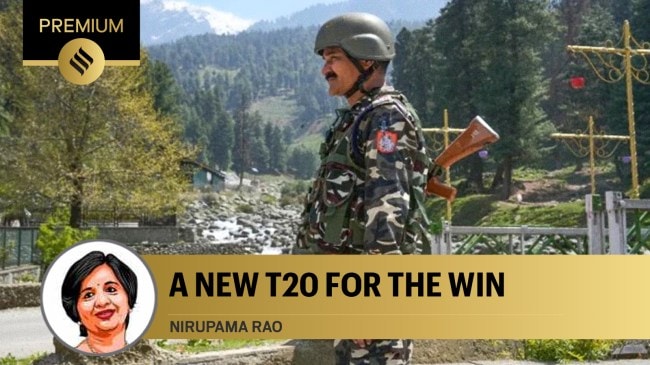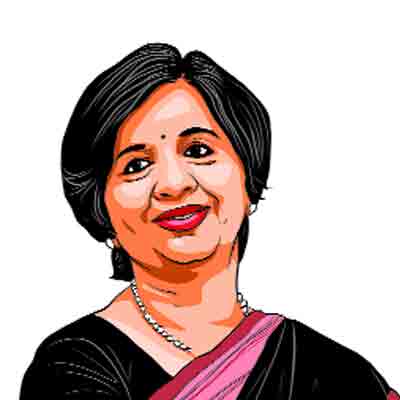Opinion A T20 for the Global South: The case for an India-led bloc against terrorism
After Op Sindoor, what is needed is a shift from episodic response to permanent institutional architecture combating terror
 A security personnel stands guard a day after a terrorist attack in Pahalgam. (PTI Photo/File)
A security personnel stands guard a day after a terrorist attack in Pahalgam. (PTI Photo/File) The terror attack in Pahalgam and the subsequent Indian military response, Operation Sindoor, have once again brought into sharp focus a reality that many in the Global South live with daily: Terrorism is not just an isolated security threat; it is an ongoing war by other means. While India showcased military precision and diplomatic discipline during the crisis, the global response to its actions also exposed gaps in the current international system’s ability to credibly and swiftly respond to terror. From these developments emerges a compelling case for a new platform, an India-led initiative: The T20 — Twenty Against Terrorism.
The Pahalgam terror attack, audacious in its planning and brutal in its execution, sparked public outrage and political consensus within India. Operation Sindoor, a swift, targeted military campaign in response, reaffirmed India’s doctrine of proactive defence. Yet, while the operation achieved its tactical goals, the international diplomatic terrain proved more complex.
While allies like the United States, France, and Israel tacitly or overtly supported India, other global institutions such as the United Nations and the Organisation of Islamic Cooperation (OIC) defaulted to calls for “restraint” and “dialogue” without assigning responsibility. China, predictably, shielded Pakistan diplomatically. Russia, once a reliable strategic partner, chose calibrated silence.
This pattern is familiar and frustrating. The international architecture for counter-terrorism — including the UN, the Financial Action Task Force (FATF), and the Global Counterterrorism Forum — either lacks teeth, is entangled in geopolitical rivalries, or remains anchored in a Western security paradigm that does not fully reflect the lived realities of terrorism in South Asia, Africa, or the Middle East.
The idea of T20 — Twenty Against Terrorism — stems from this chronic mismatch between global terror frameworks and the regional intensity of the threat. It proposes a dedicated alliance of 20 countries, led by India, comprising nations from the Global South who face frequent, asymmetrical, and politically complex terror threats. These include Indonesia, Nigeria, Kenya, Egypt, Mali, Fiji, the Philippines, and others — countries that, like India, often find themselves battling both state-sponsored and ideologically driven terrorist violence without adequate global support.
The mandate of T20 would not be to duplicate existing institutions but to supplement them with agility, real-time coordination, and a Global South-first perspective. It would focus on intelligence sharing through a joint task force; capacity building and counter-radicalisation programmes; joint diplomatic statements to name and shame state sponsors of terrorism; a permanent platform to address emerging threats like cyber-terrorism, drone-based warfare, and crypto-financing of extremism.
Having dealt with decades of cross-border terror, India has both the experience and the credibility to lead such an initiative. Unlike the West, which often views terrorism through the lens of episodic attacks or homeland security, countries in the Global South confront it as a continuous, multi-generational battle. Moreover, unlike Western coalitions that are often seen as politically selective or militarily interventionist, a T20 rooted in the Global South would command moral legitimacy and operational relevance.
The timing also matters. As multilateralism falters under the weight of big-power rivalries, smaller groupings are proving more nimble and effective — be it the Quad, I2U2, or ASEAN-led security platforms. T20 fits this trend and fills a glaring institutional gap: the absence of a platform focused specifically on terror from the perspective of its most frequent victims.
Importantly, the T20 would not seek to replace the UN or the FATF but to operate as a conscience-keeper and action-accelerator. It would bring in countries often left on the sidelines of global security debates. It would lend weight to bilateral diplomacy by providing collective legitimacy. And it would foster collaboration beyond the militaristic models of the past, emphasising data, digital tools, community resilience, and development-linked de-radicalisation.
The moral case for T20 lies in its inclusivity. Countries like Ethiopia, Kazakhstan, Sri Lanka, and Vietnam may not dominate global headlines, but they, too, have faced acts of terror that scarred their national psyche. A platform where their voices matter — where their intelligence inputs are valued, their pain recognised — would be a radical departure from the hierarchical nature of most global institutions.
most read
Strategically, India also benefits. T20 would provide it with leadership stature without the baggage of military entanglement. It affirms its image as a responsible, proactive power and strengthens its positioning as the voice of the Global South. With its experience, digital capacity, and diplomatic network, India is well-placed to host the T20 secretariat, offer training hubs, and shape the global counter-terror narrative from New Delhi.
Operation Sindoor was India’s immediate answer to a proximate threat. But the deeper lesson is that reactive strikes, however precise, are not enough. What is needed is a shift from episodic response to permanent institutional architecture. T20 answers that call. It is an idea whose time has come, and whose urgency is underscored by every fresh act of terror that rocks cities from Srinagar to Surabaya.
India must now take the next step — not just to defend itself, but to offer leadership to all those who, like it, stand on the frontline of an undeclared global war.
The writer is a former foreign secretary





